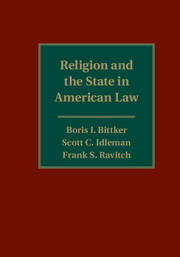Book contents
- Frontmatter
- Dedication
- Contents
- Preface
- 1 History and Introduction
- 2 Church and State in the Nineteenth Century
- 3 Religious Influences and Expressions in Law and Government
- 4 The Establishment Clause
- 5 The Free Exercise Clause
- 6 The Religious Test, Equal Protection, and Free Speech Clauses
- 7 The Definition of Religion
- 8 Church Property Disputes and Church Schisms
- 9 Contracts
- 10 Taxation
- 11 Employment
- 12 Land Use
- 13 Torts
- 14 Criminal Law and Process
- 15 Family Law
- 16 Public Education
- 17 Religious Symbolism on Government Property
- 18 Special Contexts: Prisons and the Military
- Appendix A Federal Constitutional Provisions
- Appendix B State Constitutional Provisions
- Appendix C Selected Federal Statutes 910
- Index
10 - Taxation
Published online by Cambridge University Press: 05 October 2015
- Frontmatter
- Dedication
- Contents
- Preface
- 1 History and Introduction
- 2 Church and State in the Nineteenth Century
- 3 Religious Influences and Expressions in Law and Government
- 4 The Establishment Clause
- 5 The Free Exercise Clause
- 6 The Religious Test, Equal Protection, and Free Speech Clauses
- 7 The Definition of Religion
- 8 Church Property Disputes and Church Schisms
- 9 Contracts
- 10 Taxation
- 11 Employment
- 12 Land Use
- 13 Torts
- 14 Criminal Law and Process
- 15 Family Law
- 16 Public Education
- 17 Religious Symbolism on Government Property
- 18 Special Contexts: Prisons and the Military
- Appendix A Federal Constitutional Provisions
- Appendix B State Constitutional Provisions
- Appendix C Selected Federal Statutes 910
- Index
Summary
Overview
Taxation is highly relevant in the law and religion context. Numerous issues have arisen regarding the relationship between religious entities or individuals and federal or state taxes. This chapter will explore these issues in detail. We note that perhaps the greatest tax expert in history, Boris Bittker, originated the idea for this book and wrote several chapters. Unfortunately, he did not have the opportunity to write the tax chapter before he passed away. Thus we humbly submit this chapter with the understanding that it will not likely meet the standards of perfection that Boris would have achieved. We hope that all readers will understand that any limitations or errors in this chapter are in no way attributable to Professor Bittker.
After this overview, the chapter begins with a brief examination of U.S. Supreme Court decisions relevant to religion and taxation. These decisions are revisited in greater detail in some of the subsequent sections. The purpose of the initial section is to set forth some of the basic ground rules established by the Supreme Court in tax cases under the Establishment and Free Exercise Clauses.
The next section of the Chapter addresses federal taxation, including § 501(c)(3) exemptions, church status, parsonage exemptions, and Social Security taxes. The final section addresses state and local taxation. The issues in this section include state and local income tax, property tax, and sales tax. Please note that this chapter does not address taxpayer standing issues because they are addressed at Chapter 4.E.1.
The U.S. Supreme Court Landscape
A number of cases decided by the U.S. Supreme Court directly address the constitutional issues raised when tax exemptions are given to, or denied to, religious entities. This section will provide a brief overview of the most significant of these cases. The cases discussed in this section and other relevant Supreme Court decisions also will be discussed where relevant in subsequent sections of this chapter. These cases do not answer many of the diverse questions that arise in the tax context, but they do lay a foundation regarding what may or may not be constitutional.
- Type
- Chapter
- Information
- Religion and the State in American Law , pp. 414 - 450Publisher: Cambridge University PressPrint publication year: 2015



